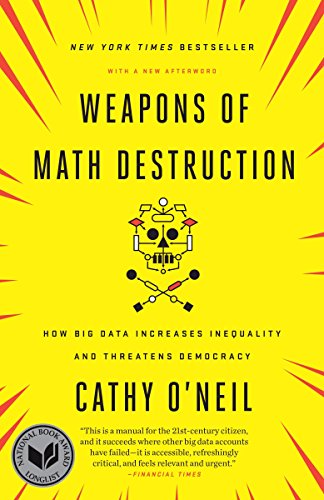In her 2016 book Weapons of Math Destruction: How Big Data Increases Inequality and Threatens Democracy, Cathy O’Neil argues that the algorithms that are increasingly being used to make decisions about our lives are often biased, opaque, and unfair. She calls these algorithms weapons of math destruction
because they can have a devastating impact on individuals and society as a whole.
O’Neil begins by providing an overview of how algorithms are used in a variety of different settings, including education, criminal justice, and finance. She then goes on to discuss the ways in which these algorithms can be biased against certain groups of people. For example, she cites studies that have shown that algorithms used to predict recidivism rates are more likely to predict that black defendants will reoffend than white defendants, even when they have similar criminal histories.
As O’Neil mentions in her book, Tennessee and 39 other states still allow credit checks for hiring and promotions, perpetuating a system that punishes people for things that aren’t relevant to being a good employee.
The practice of using credit scores in hirings and promotions creates a dangerous poverty cycle. After all, if you can’t get a job because of your credit record, that record will likely get worse, making it even harder to land work…
Cathy O’Neil, Weapons of Math Destruction: How Big Data Increases Inequality and Threatens Democracy
O’Neil also argues that algorithms are often opaque, meaning that it is difficult for people to understand how they work or how they make decisions. This can make it difficult for people to challenge the results of an algorithm, even if they believe that it is unfair.
Finally, O’Neil argues that algorithms are often unfair, meaning that they can lead to negative outcomes for certain groups of people. For example, she cites studies that have shown that algorithms used to determine who gets a loan are more likely to deny loans to black and Hispanic borrowers than white borrowers.
O’Neil concludes her book by calling for more transparency and accountability in the use of algorithms. She argues that we need to be more aware of the potential biases and dangers of these tools, and that we need to develop ways to make them more fair and equitable.
Conclusion
Weapons of Math Destruction is an important book that provides a much—needed critical perspective on the use of algorithms in our society. O’Neil’s work is essential reading for anyone who is concerned about the potential for these tools to be used to discriminate against certain groups of people.
O’Neil does a good job of explaining complex concepts in a clear and concise way. The book is well-written and engaging; I didn’t find it the least bit boring or technical. I think this could be an important way forward toward accountability in our algorithms—making sure that non-technical people can understand what an algorithm is doing and how it accomplishes its goals.
Furthermore, she provides a wealth of evidence to support her claims. O’Neil cites multiple studies, interviews, or real-life examples in each chapter of her book, highlighting the need for greater transparency.
Cathy O’Neil is a strong advocate for social justice and equity. It’s important that people who truly stand for “liberty and justice for all” are in positions of influence in every industry.
Overall, Weapons of Math Destruction is an important and timely book that should be read by more than just data scientists. I’m very glad to have read this, and I learned so much. I wholeheartedly recommend Weapons of Math Destruction.
